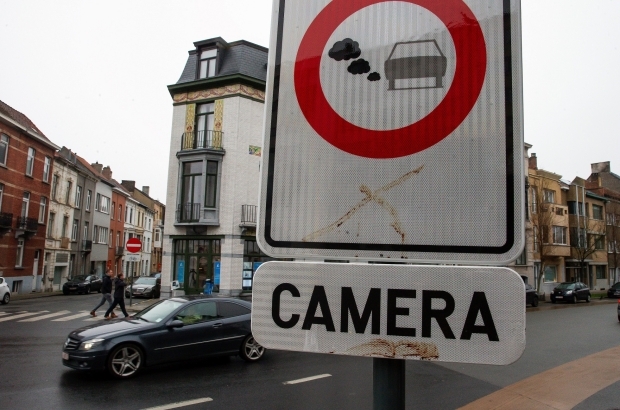- Daily & Weekly newsletters
- Buy & download The Bulletin
- Comment on our articles
Proposed low-emissions delay could cost Brussels millions of euros
Postponing stricter low-emission zone (LEZ) standards could cost Brussels tens of millions of euros, according to a memo from the Brussels regional administration.
Stricter standards for the capital’s LEZ zones were scheduled to come into force at the start of next year until a surprise ordinance from parties MR, Les Engagés, PS and Open VLD proposed delaying it until 2027, sparking fierce debate and derailing the post-election formation of a new Brussels government.
Motorists' associations support the two-year delay of tighter rules for polluting vehicles, while public health proponents are appalled that a city with air pollution as bad as Brussels would even consider softening its stance.
A memo examined by Bruzz revealed that if Brussels postpones the tightening of the low-emission zone by two years, the region risks a hefty European fine of €19 million.
This is because under the intra-Belgian agreements on effort sharing, a region that misses its target will have to compensate by buying emission permits.
The regional administration calculated exactly what the delay would mean for the region's greenhouse gas and nitrogen dioxide emission targets in a document produced at the request of current Brussels environment minister Alain Maron (Ecolo).
Calculations found that the region would emit 188.1 kilotonnes of CO₂ more by 2030 than if the current LEZ timings were maintained, causing Brussels to fail to meet its target of reducing greenhouse gas emissions by 47% by 2030. Instead, the drop would be only 43%, falling short of European Commission requirements.
“According to the modalities of burden sharing, such an overshoot could cost the region a fine of €19 million,” the paper reads.
In theory, emissions reductions could also be achieved through means other than targeting car traffic. But experts say car traffic is the number one factor in Brussels’ air pollution, and the paper points out that restrictions on secondary factors, such as heated buildings, for example, are already particularly stringent.
The figures also indicate that a two-year postponement will ensure that by 2030, nitrogen dioxide levels exceeding EU standards will be emitted on 135 additional kilometres of street network, accounting for 8% of all Brussels streets.
“It has been proven that the LEZ is the most important tool to fight against NO₂ pollution in the city,” said Pierre Dornier, managing director of Les Chercheurs d'Air.
“This further proves what a bad idea the LEZ deferral is. You don't play around with the health of Brussels residents.”
Proponents of the delay shy away from connecting their arguments to the demands of the automobile industry and its major players, arguing instead that it is difficult for many Brussels residents to afford to upgrade their cars to less-polluting models.
“But you can perfectly keep the LEZ and financially support the people who really need a car and cannot afford it,” Dornier countered. “In reality, by the way, that's a very small group.”
Le Soir’s estimates found that with two more years of Euro 5 diesel and Euro 2 petrol vehicles in the city - affecting 33,000 Brussels vehicles - there would be “a surplus of 188,100 tonnes of CO2 equivalent”.
The commitment to reduce greenhouse gas emissions in non-industrial sectors by 47% by 2030 (compared with 2005) would also be “extremely difficult” to achieve.




















Comments
Cannot wait for the alternative facts crowd to tell us here in the comments that cars matter more than air quality and people’s health
Cars set aside, the truth is that the implementation of NET ZERO of which LEZ is only a part of, will cost billions nationally.
The pretext of cleaner air & better health outcomes, sounds nice but in the big picture is simply nonsense.
There is no analysis attributing any percentage of the improvement of air quality to LEZ.
Hints: it could be due to reduction of production facilities upwind, OR simply due to a small percent change in wind velocity OR an artifact of the locations where the sensors were placed OR, OR, OR...
Also, when our food and our bodies are full of microplastics, when we are being coerced, mandated or even forced to inject ourselves with (still) experimental injections, the air quality in the relatively low population Belgian cities is not at the top of the list.
There are other much higher health priorities that our politicians better tend to, or they could just quit and go home.
There are so many reasons for the poor air quality, including industrial incinerators (e.g. Bruxelles-Propriété) that shoot smoke into the air. Putting all the blame for pollution on cars may be politically expedient but that doesn't mean it's correct.